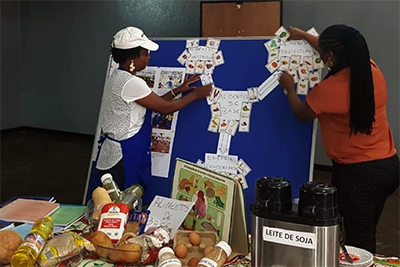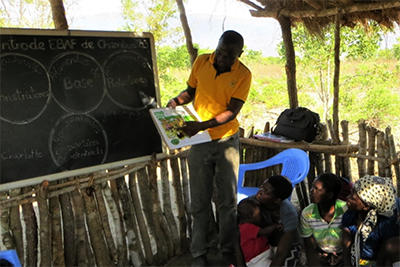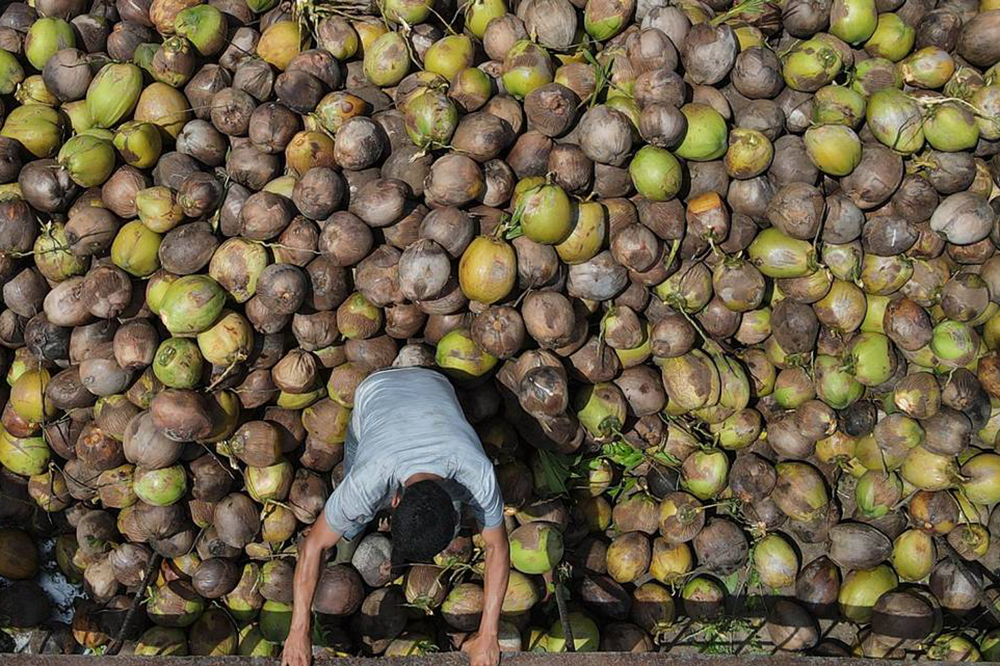
As a development nutritionist, my wish for the New Year is for every agriculture and market-oriented project to be nutrition-sensitive. Already fulfilling that wish is NCBA CLUSA’s Promotion of Conservation Agriculture (PROMAC) project in Mozambique. Funded by the Royal Norwegian Embassy, PROMAC is implemented in seven districts within the provinces of Manic and Zambezia. At face value, PROMAC’s objectives to encourage the adoption of climate smart agriculture (CSA) practices, increase yields, incomes, land tenure rights and literacy rates—all while being inclusive of women and youth—does not scream “nutrition.” But during a recent visit to the project, I uncovered the nutrition-sensitivity at the heart of PROMAC activities since the project began in 2012.
The nutrition-sensitive agriculture approach recognizes that for good nutrition to happen, interventions must address the underlying determinants for positive nutrition and health outcomes. To create this enabling environment, practitioners use the agriculture-to-nutrition pathways as a guide for entry points along value chains to influence nutrition outcomes. The three main pathways are food production, income and women’s empowerment, with the latter also cross-cutting to the first two.
PROMAC is introducing labor saving technologies such as rippers and other CSA practices that preserve the environmental integrity of the soil and improve yields. By aerating the soil and making it easier to cultivate, rippers decrease the time and labor burdens associated with farming—especially for women.
Additionally, the project has commissioned a study to better understand the price mark-up along targeted value-chains in order to identify ways to decrease prices for consumers without jeopardizing income for producers. Facilitating linkages to input suppliers, particularly female agridealers, improves crop quality and yields. When combined with messaging around keeping a portion of the yield for home consumption, nutrition is being addressed through multiple channels.
Land rights in Mozambique, called DUATs, are important for nutrition-sensitive agriculture. Studies indicate that farmers are more likely to invest in land where they have a legal claim. PROMAC is encouraging multiple family members, including women, to include their names on the legal document, thus ensuring that the family will not suddenly become landless in the event of a death. By mitigating the risk of losing access to their land, having the DUAT encourages farmers to invest in quality seed, high-value horticulture, inputs and services and practice CSA—activities that improve resilience and ultimately nutrition for the household. Another layer of security the project provides is assisting women to procure identification cards that enable them to engage in certain market activities.

PROMAC recognizes that adult literacy and numeracy are fundamental skills for market participation. Literacy rates among smallholder producers tend to be low, especially among women. Through existing and new centers for adult literacy, located in rural communities, women and men are learning the basic skills to communicate in Portuguese. The centers provide a platform to disseminate nutrition messages including infant and young child feeding practices and the importance of diet diversity and food safety.
The project plans to pilot a household budgeting module to further apply literacy and numeracy skills towards money management, equitable decision making and greater dietary diversity. PROMAC is collaborating with Mozambique’s Ministry of Education to support literacy centers and encourage sustainable uptake of center activities and modules.
PROMAC also incorporates nutrition messaging into Farmer Field Days, developing educational radio spots in coordination with the local Community Radio and partnering with the Technical Secretariat for Food Security and Nutrition (SETSAN) to hold cooking demonstrations that focus on local ingredients and target crops like soybeans. Participants have learned how to make nutrient-rich porridges, soy beverages and incorporate soy flour into baking. The PROMAC staff are sharing their nutrition activities widely through local events such as a technology fair held at the Chimoio campus of the Catholic University of Mozambique.
To truly be recognized as nutrition-sensitive, PROMAC has begun tracking diet diversity indicators. The project will use the Household Diet Diversity Score (HDDS) to measure economic access to diverse foods and incorporate Minimum Diet Diversity Score for Women (MDDS-W) to assess improvements in diet quality among women. Chances are, if women are consuming an array of nutritious foods, the whole household is enjoying improved nutrition.
Combine this positive nutrition outcome with PROMAC’s broader goal to build the economic and environmental resilience of farmers, and we have a recipe for sustainable success.


